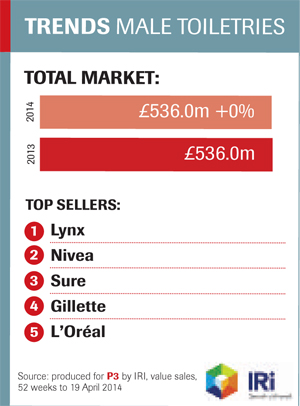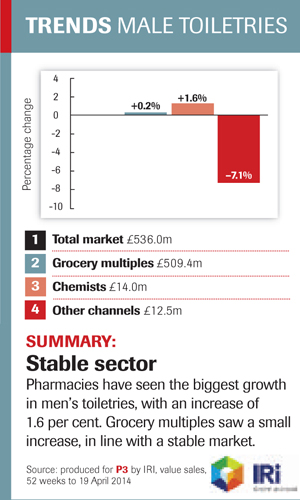Promote men's health and boost your business
In Healthy living
Follow this topic
Bookmark
Record learning outcomes
Despite many targeted health campaigns over the years, primary healthcare services €“ including pharmacies €“ are still underused by men
'Men should be using pharmacies, because these offer an easily accessible service, no appointment needed €“ all the things GPs don't offer,' says Peter Baker, independent men's health consultant. 'However, all the evidence suggests that they aren't using pharmacies in significant numbers. They may pop in to get a prescription or buy the occasional over-the- counter medicine, but they are not having a conversation with the pharmacist. They may be embarrassed about talking to a healthcare professional in what they see as an open space, not realising that most pharmacies have confidential areas.'

This year's World Cup, which takes place from June to July, provides an ideal opportunity for pharmacies to promote men's health and fitness. So what should pharmacists be doing to attract men across their threshold?
1. De-feminise the pharmacy
In 2009, research by the Men's Health Forum revealed that men view pharmacies as 'racks of make-up and no spanners'. According to Mr Baker, pharmacies need to adjust accordingly. 'Pharmacies are seen as feminised spaces,' he says. 'The whole front of the shop is often taken up by products aimed at women or children, and the counter staff are often female, so some men are more reluctant to ask for advice. It's time to de-feminise the pharmacy and give more prominence to men's issues and products.'
2. Know the market
Traditionally, men's health issues have included hair loss, dandruff, bowel problems, smoking and stress. But, according to Dean Enon, Pharma Nord PR executive and product manager, pharmacies should be offering solutions for the issues facing men today, such as sexual wellness, energy and vitality, fatherhood and heart health. Nutritional supplements, such as Prelox and B-Daddy, can allow men to support their diets and lifestyles, supplying them with the extra nutrients they need to maintain an active lifestyle, love life or even to improve their chances of becoming a dad,' he says.
3. Offer one-to-one advice
Mr Enon believes online competition means that pharmacies need to make their service more personal. 'It takes trust for a lot of men to reach out for health support,' he says. 'One-on-one advice has a greater impact, and pharmacies have the authority and the scope to offer this. Pharmacies can work with reputable brands that can offer training and products that have proven efficacy to grow profit and retain customers.' According to a spokesperson for Alpecin shampoos, which are being advertised on TV throughout 2014, customers put special trust in the pharmacist. 'The customer has a problem and is looking for the right solution,' he says. 'A competent consultation and a range of products that offer a scientifically proven benefit can solve the customer's problem and generate sales for the pharmacist.'
 4. Expand on sports nutrition
4. Expand on sports nutrition
Craig Reed, MaxiNutrition's marketing manager at GSK, highlights the fact that sports nutrition is developing rapidly in the UK. 'By making the sports fitness fixture clear to navigate, and making it easy for shoppers to select the most appropriate product, pharmacists can help drive growth within the category,' he says. 'GSK, the maker of MaxiNutrition, aims to drive change within the sports fitness market by establishing protein nutrition as an everyday staple. The #FeedYourMuscles campaign, which has been running since March, features everyday people, with the aim of inspiring while educating consumers.'
Bio-Synergy founder Daniel Herman says, at present, about 10 million men exercise regularly in he UK, but only five per cent use sports nutrition to support their goals. 'As professionals, pharmacists can offer expert advice to improve performance, but also to reduce injuries,' he says. 'They should discuss with customers their goals, diet, how regularly they exercise, age, any pre- existing conditions/injuries, etc. We are launching ActiVeman, which is ideal for those training twice per week or competing at the highest level, to get more out of their training or develop the physique that they have been working so hard for.'
5. Offer practical advice
According to Matthew Jamieson, senior product manager for Deep Freeze, it's vital that customers know how to use the products, such as topical analgesics. 'Good signposting, plenty of information for customers, discreet advice and consultation and a comprehensive range of effective, trusted products will all help to make pharmacy a place where men €“ notoriously reluctant to discuss their health issues €“ will feel at ease and confident that they will be able to walk away with products that can really help,' he says. 'Mentholatum has created two videos €“ now available on YouTube €“ which are designed to bring to life the Self Care Forum factsheets on lower back pain and sprains and strains in an easily understood and engaging form.'
6. Overcome any embarrassment
A recent survey by TENA Men revealed that 42 per cent of men ignore the fact they are unwell rather than visiting a pharmacy or doctor. Bladder weakness, which affects one in nine men at some point in their lives, can be particularly difficult to talk about. 'The most important thing is to reassure them that it is a common occurrence that affects one in nine men, and that there are products on the market, such as TENA Men, which are specifically designed to enable the continuation of their everyday lives,' says Donna Wilson, TENA training and brand manager. 'If the customer wishes to discuss their experience in a more private environment, pharmacy staff should explain that a quiet area or consultation room is available.'
 7. Offer grooming advice
7. Offer grooming advice
According to Elen Ormson, assistant brand manager for Neutrogena UK, working environments are becoming increasingly competitive, so men look towards toiletries to maintain a professional image. Common men's health concerns include thinning hair/hair loss, dandruff, a dry/itchy scalp and greasy hair. 'The two-in-one market has grown massively as men look for convenience, ie shorter shower times,' she says. 'The Neutrogena brand is excited to announce the first two-in-one shampoo product in the T/Gel range. The Neutrogena T/Gel 2-in-1 Dandruff Shampoo Plus Conditioner relieves the itching and flaking of dandruff, while leaving hair soft and manageable.'
8. Stock the latest products
Nick Gibbens, spokesperson for The Bluebeards Revenge, says pharmacies need to have better designed male-dedicated areas, use samples much more effectively, utilise point of sale material more intelligently and train staff to be more knowledgeable on the product ranges, USPs and benefits.
'We have just launched a cooling moisturiser and a premium brushless shaving gel that tackles heavy beard growth,' he says. 'We are launching a range of new hair care and styling products in June. Men are taking more of an interest in skin care, beyond just using a moisturiser after shaving. They are coming into store asking for specific types of moisturiser: so a balm or a gel as well as the standard cream.'
Alex Meir, marketing manager for male grooming at Philips UK, says pharmacies need to be as knowledgeable as possible about the latest tools available to help men achieve the look they want.
'Following the trend for less frequent shaving, system blades have seen a 12 per cent volume decline in the past year,' he says. 'Men are shaving less often and facial hair is once again becoming the norm. Pharmacies need to make sure they are stocking more grooming tools such as beard trimmers as opposed to just shaving tools. Philips has launched the Beard Trimmer 9000, the world's first laser guided beard trimmer, helping men to plan and perfect their desired beard style.' Men's Health Week This year's Men's Health Week 2014 takes place between 9 and 15 June and focuses on health and work, including stress and unemployment. The Men's Health Forum, which is leading the awareness week chose this topic because male identify is strongly tied up with work and how they earn a living. The Men's Health Forum can provide pharmacies with a resource pack, including posters, newsletters and up to date information on how to improve male health in the workplace. G Visit menshealthforum.org.uk for more information.
Comment
 Lila Thakerar, Shaftesbury Pharmacy, Harrow 'This is a category that thrives on the high street, but not in a suburban community pharmacy like ours. A true challenge for us is to encourage men to consult the pharmacy team for issues relating to their health and we may introduce more male staff on the counter. One opportunity is when a male customer is a smoker and this can lead to sales of NRT products, and we may also recommend vitamin supplements when customers portray a lifestyle that does not include a healthy diet. Having a display of male hair and skin products with clear signage can lead to impulse purchases. Lynx, Sure and Nivea are brand leaders within our pharmacy for grooming.'
Lila Thakerar, Shaftesbury Pharmacy, Harrow 'This is a category that thrives on the high street, but not in a suburban community pharmacy like ours. A true challenge for us is to encourage men to consult the pharmacy team for issues relating to their health and we may introduce more male staff on the counter. One opportunity is when a male customer is a smoker and this can lead to sales of NRT products, and we may also recommend vitamin supplements when customers portray a lifestyle that does not include a healthy diet. Having a display of male hair and skin products with clear signage can lead to impulse purchases. Lynx, Sure and Nivea are brand leaders within our pharmacy for grooming.'
 Dilip Patel, Mirage Pharmacy, Handsworth 'Men generally only come in to the pharmacy for their prescriptions or if they've run out of their shaving foam or razor blades. It's also a small shop with limited room for men's health and grooming. Despite that, we do have men asking for advice. The young men ask for advice on their physical health, such as bodybuilding and vitamins. As it is most often women who ask for advice on behalf of their husbands or sons, a wider advertising campaign encouraging men to come into pharmacies for advice might be a good idea. TV advertising sponsored by the government during a sports programme, for example, might make men more aware of what we can offer them.'
Dilip Patel, Mirage Pharmacy, Handsworth 'Men generally only come in to the pharmacy for their prescriptions or if they've run out of their shaving foam or razor blades. It's also a small shop with limited room for men's health and grooming. Despite that, we do have men asking for advice. The young men ask for advice on their physical health, such as bodybuilding and vitamins. As it is most often women who ask for advice on behalf of their husbands or sons, a wider advertising campaign encouraging men to come into pharmacies for advice might be a good idea. TV advertising sponsored by the government during a sports programme, for example, might make men more aware of what we can offer them.'
 Nemesh Patel, AMG Pharmacy, Braintree 'Men's health is a booming sector for us and a significant portion of our shelf space is dedicated to the lucrative men's health market. Vitabiotics Wellman, Nicorette lozenges, Lynx and Gillette are brands customers frequently ask for. Male grooming is on the up in our area, creating a significant opportunity for pharmacies to entice more men through our doors. This can strengthen relationships with the male clientele, which allows pharmacists to discuss male health issues that many men feel embarrassed talking about, such as erectile dysfunction and hair loss. I encourage more men to take an interest in health-related issues. I suggest pharmacies hold men's health campaigns days, such as prostate cancer day, to raise awareness of important men's health issues in their community.'
Nemesh Patel, AMG Pharmacy, Braintree 'Men's health is a booming sector for us and a significant portion of our shelf space is dedicated to the lucrative men's health market. Vitabiotics Wellman, Nicorette lozenges, Lynx and Gillette are brands customers frequently ask for. Male grooming is on the up in our area, creating a significant opportunity for pharmacies to entice more men through our doors. This can strengthen relationships with the male clientele, which allows pharmacists to discuss male health issues that many men feel embarrassed talking about, such as erectile dysfunction and hair loss. I encourage more men to take an interest in health-related issues. I suggest pharmacies hold men's health campaigns days, such as prostate cancer day, to raise awareness of important men's health issues in their community.'
